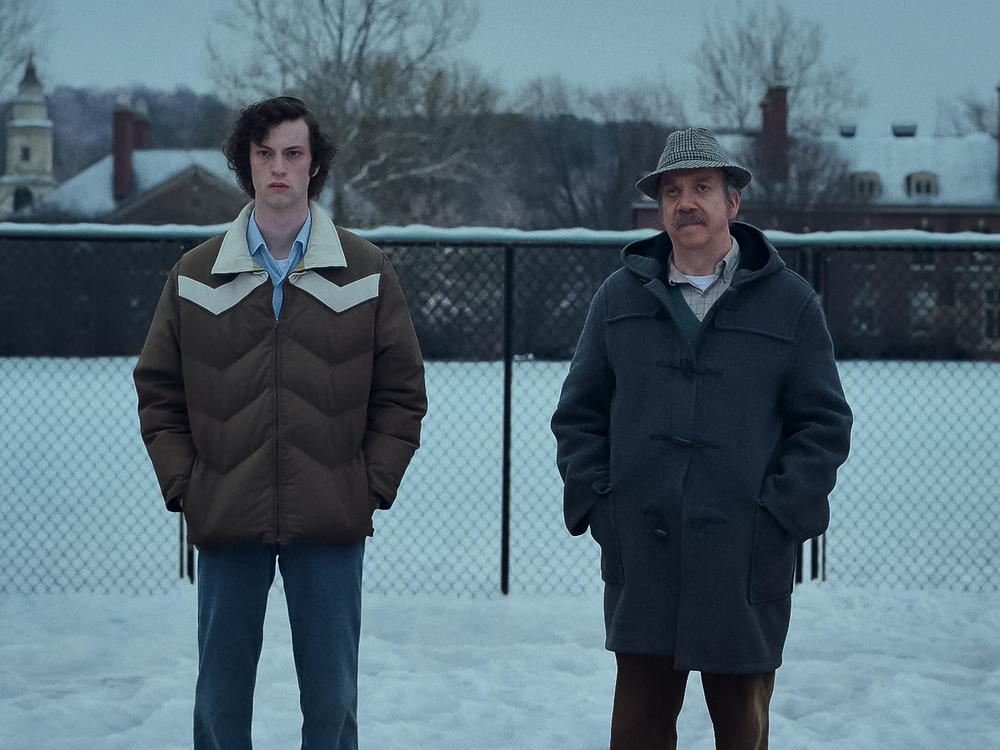Section Branding
Header Content
Alexander Payne keeps real emotion at bay in the coyly comic 'Holdovers'
Primary Content
Even as someone whose job is to complain about the state of contemporary filmmaking, I've never really bought into the idea that "They don't make 'em like they used to" — something moviegoers have been saying since the silent era.
Still, I understand why some critics have been waxing so nostalgic in their praise of The Holdovers. From the moment its scratched-up retro-style studio logo appears, Alexander Payne's new film offers itself up as a throwback to a time when thoughtful, character-driven comedies for adults were more of a staple than they are now. The movie isn't just set in 1970; it wants to look as though it were made in 1970.
It's also a reunion for Payne and actor Paul Giamatti, nearly 20 years after their superior wine-country comedy Sideways. In The Holdovers, Giamatti again plays a hard-drinking, sharp-tongued curmudgeon with tragicomic verve. This time he's Paul Hunham, a teacher of ancient history at a prestigious New England boarding school called Barton Academy.
Paul believes in showing tough love to his students, whom he openly refers to as "degenerates" and "reprobates." On the last day of school before winter break, he hands the boys back their exams, which nearly all of them failed.
The only student to get a decent grade is Angus Tully, played by Dominic Sessa. He's a sharp, smart kid with a rebellious streak, fueled in part by family problems back home. When he learns that his mom and new stepdad have decided to spend the holidays honeymooning in the Caribbean, Angus is forced to stay at Barton for two weeks under Paul's supervision.
There are four other young holdovers as well, but David Hemingson's script conveniently gets them out of the way. Joining Paul and Angus is the school cafeteria manager, Mary Lamb, wonderfully played by Da'Vine Joy Randolph from Dolemite Is My Name. It's Mary's first Christmas since her son, a Barton grad, died serving in the Vietnam War.
A prickly teacher, an angry student and a grieving cook cooped up together for two frigid weeks without central heating sounds like a recipe for horror-movie disaster: The Catcher in the Rye meets The Shining. Thankfully, no one gets axed to death in The Holdovers, though someone does end up in the hospital after a minor accident.
Soon the three find better reasons to leave campus, attending a Christmas Eve party and taking an unexpected field trip to Boston. Road trips have been something of a Payne specialty in movies like Sideways and Nebraska, a chance for rough-edged characters to travel together and bond over each other's losses and disappointments.
That's a lovely idea, and The Holdovers sometimes lives up to it. Some of the best scenes find Paul and Mary watching TV, drinking whisky and joshing with each other well into the wee hours. These moments have a lived-in casual-hangout quality that's missing elsewhere.
In their many arguments, Paul and Angus tend to spell out the obvious — how they're feeling, why they're mad at each other and all the awful things they've been through. Giamatti is a skilled enough actor to make this seem like part of Paul's overbearing nature. But Sessa, an appealing newcomer, doesn't fare as well; too often he's made to talk about his teenage angst rather than embody it.
And then there's Mary, whose name can't help but smack of cheap symbolism given that she's mourning a child at Christmastime. The script doesn't know what to do with Mary besides sanctify her, turning her grief into a prop. That's a shame, since Mary is easily the most interesting character here, which is due entirely to the terrific comic timing and deep emotion that Randolph brings to an underwritten role.
Watching Paul, Angus and Mary, we're meant to reflect on the social turmoil of the past and how it dovetails with the present. Angus' family drama touches on depression and mental illness. The death of Mary's son in Vietnam raises issues like racism and classism. But these points are glossed over in a movie that skims the surface of its '70s milieu without fully engaging with it.
Payne isn't really "making 'em like they used to"; beneath its old-school aesthetic, The Holdovers faces a problem that's all too familiar in this director's work: a coyness about his characters and their circumstances that keeps real emotion and holiday spirit at bay.
Copyright 2023 Fresh Air. To see more, visit Fresh Air.
Bottom Content




